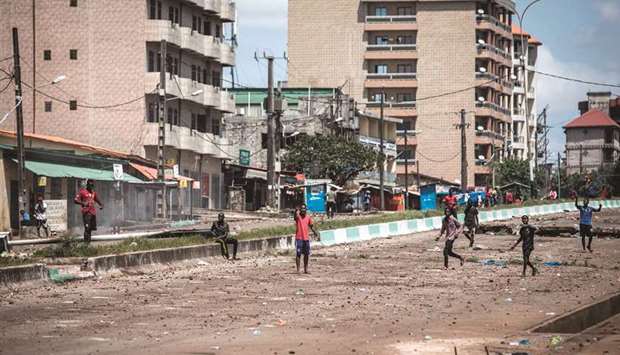Guinea, gripped by days of post-election violence, suffered widespread Internet disruptions yesterday and the government mobilised the army after preliminary results showed a victory for President Alpha Conde.
Figures released by the election commission late Thursday showed the 82-year-old incumbent, who is seeking a controversial third term, was the clear leader in Sunday’s first round.
But opposition candidate Cellou Dalein Diallo has claimed victory and his camp has accused the government of “large-scale fraud” in counting ballots.
Internet monitoring group NetBlocks said it suspected the internet outage was an attempt by the government to restrict activity on social media to weaken the opposition.
“The incident appears to be consistent with previous restrictions attributed to state controls during elections in the country,” NetBlocks executive director Alp Toker told AFP.
AFP journalists reported that they had lost their internet connection on the Orange cell phone network, which is ubiquitous in Guinea.
A spokeswoman for Orange Guinea said the network’s connection to the internet had been “cut at the point of access”. Meanwhile, the government mobilised the army, national television announced Thursday night, while clashes between young supporters of Diallo and security forces were reported yesterday in Conakry and in the provinces.
An AFP journalist saw about 30 vehicles loaded with soldiers driving to neighbourhoods that have been hotbeds of violence and protests for months.
In a confused incident, on the outskirts of Conakry yestserday, five people were killed when a train carrying fuel was attacked after the rail tracks were sabotaged.
At least three gendarme police, a soldier and a civilian were killed in violence that followed in the Sonfonia district, said a government official, who spoke on condition of anonymity and give no further details.
The International Criminal Court’s chief prosecutor also warned yesterday that rival parties in Guinea could be prosecuted after fighting erupted.
“We are...continuing to closely monitor developments on the ground. The violence must stop,” Fatou Bensouda said in a tweet.
“I wish to repeat this important reminder: anyone who commits, orders, incites, encourages and contributes in any other way to crimes...
is liable to prosecution either by the Guinean courts or the ICC,” she said.
Guinea has been in a deep political crisis for the past year, with mass protests against Conde’s re-election bid violently put down and dozens of people killed by security forces.
Since Monday, violence in cities across the country has left around 10 people dead, according to the authorities, while the opposition says 27 people have been killed.
Family members reported five more deaths in the capital Conakry and in the provinces late Thursday, figures AFP was unable to confirm.
Guinea’s Independent National Electoral Commission published a provisional vote tally late Thursday, with ballots counted in 37 out of 38 constituencies.

Protesters gesture, as they continue to throw stones and block roads during mass protests after preliminary results were released in Conakry, yesterday.
